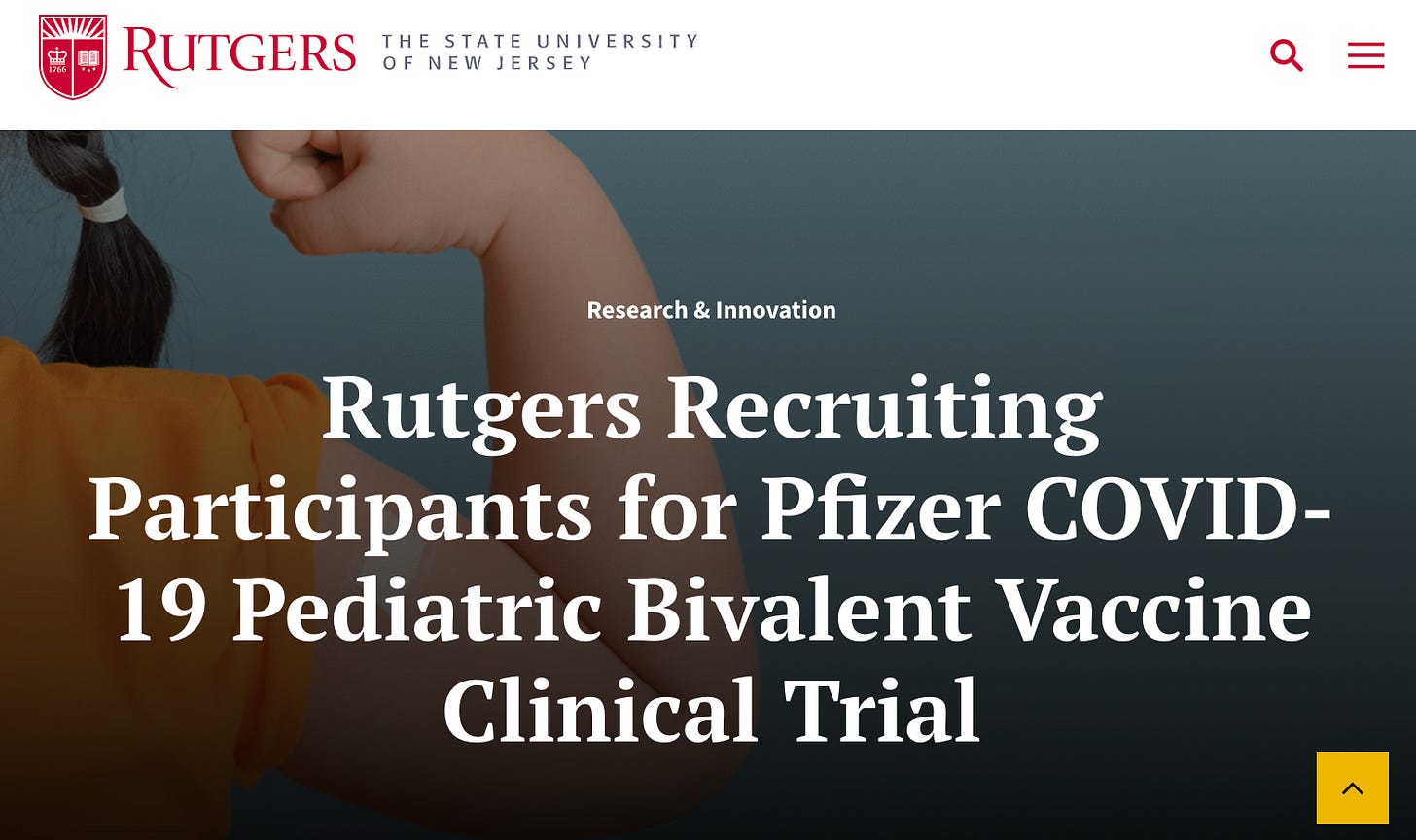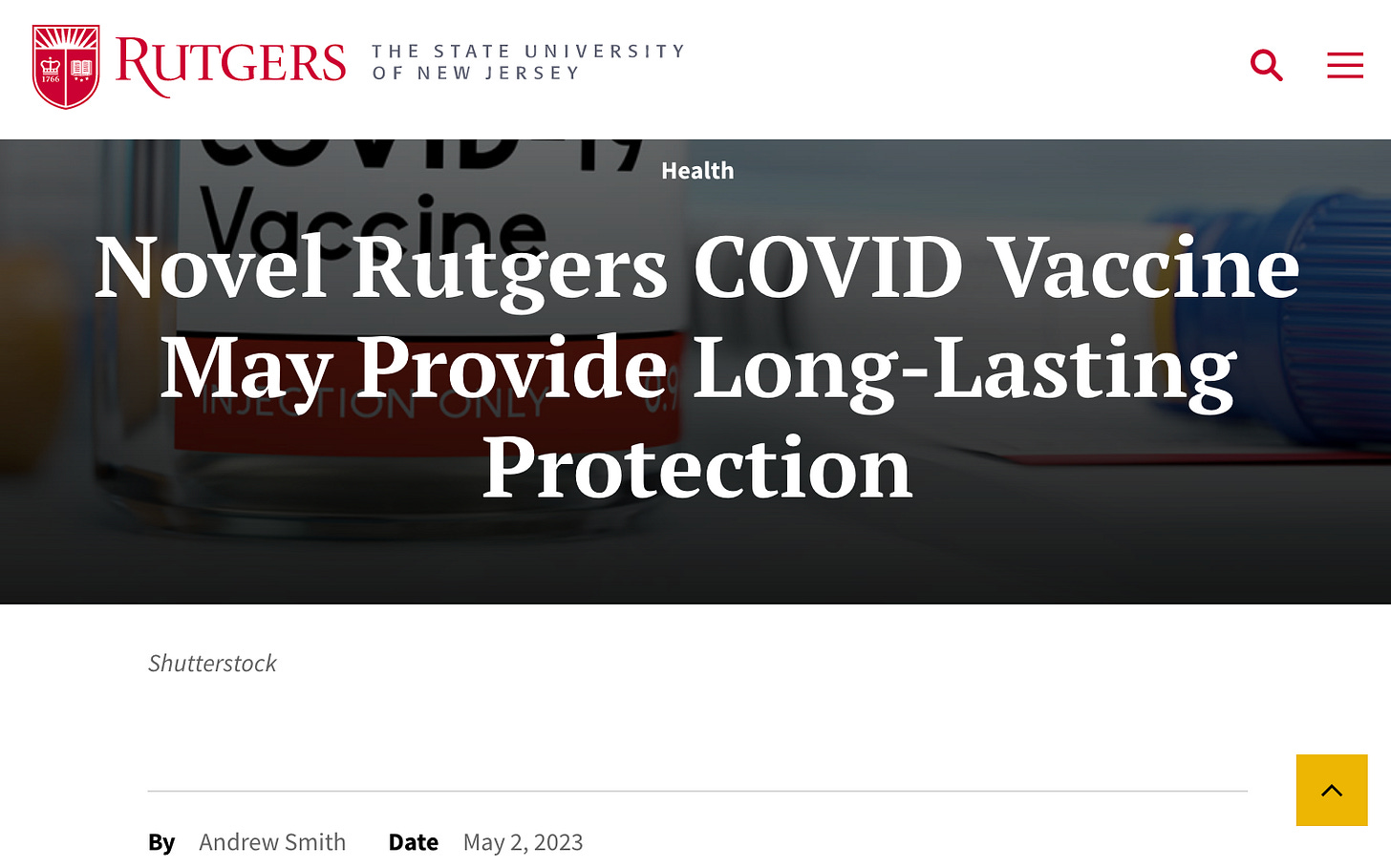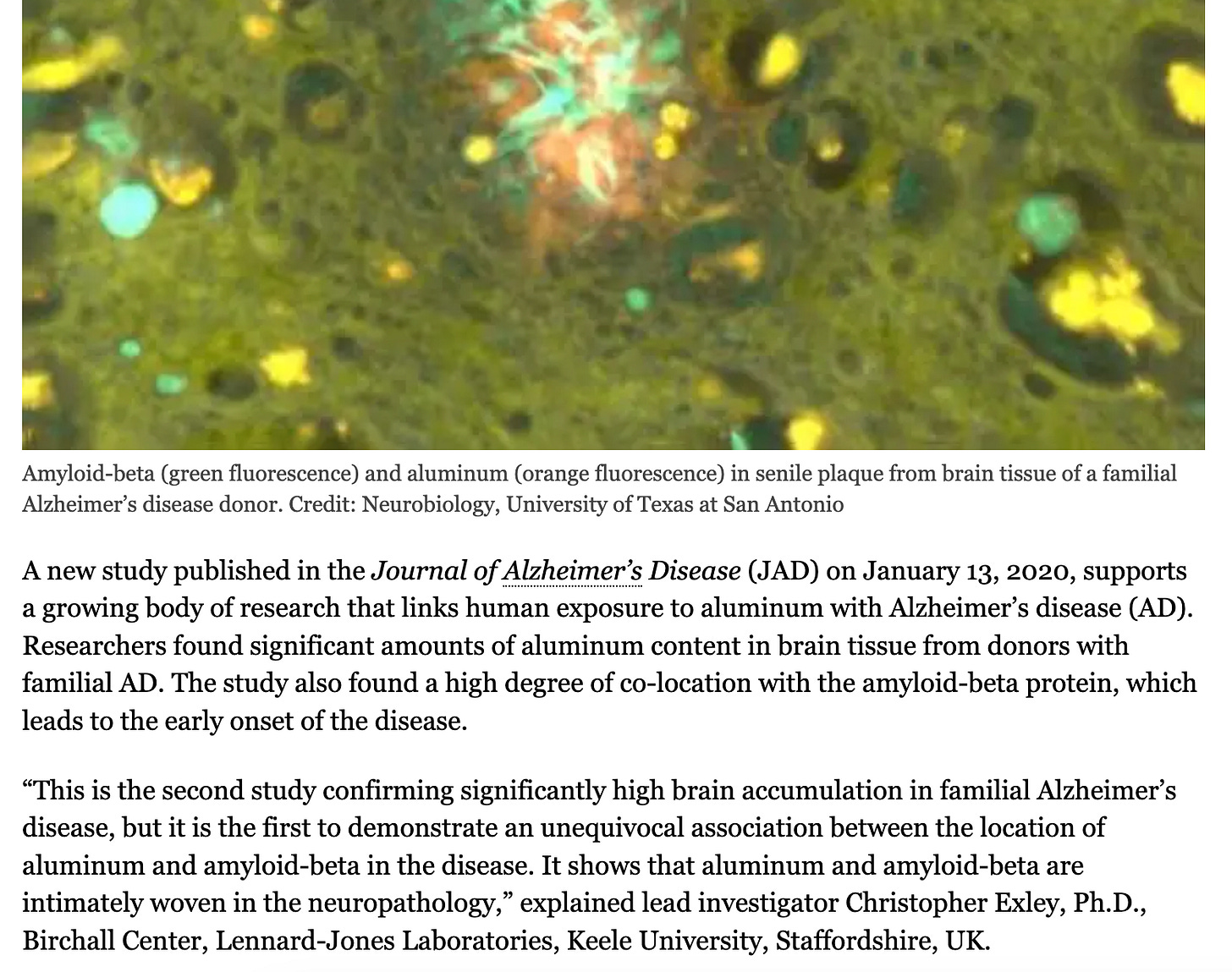According to a recent study published in Vaccines, a novel Covid vaccine developed at Rutgers, dubbed MT-001, may provide longer-lasting protection in humans against some variants of the virus. “May” being the key word as the study was done on mice and hamsters.
Let’s take a look…
Starting at the Bottom Line
If you read all the way to the end of the study, under “Conflicts of Interest”, you will discover that senior authors Elliot Campbell and Stephen Anderson are also co-founders and shareholders of Macrotope, Inc. and are named as inventors on patent applications describing MT-001 filed by Rutgers University. Incidentally, Macrotope, a Rutgers spin-out company, also partially funded the study.
From the Abstract:
Here, we describe a novel protein component vaccine candidate, MT-001, based on a fragment of the SARS-CoV-2 spike protein that encompasses the receptor binding domain (RBD). Mice and hamsters immunized with a prime-boost regimen of MT-001 demonstrated extremely high anti-spike IgG titers, and remarkably this humoral response did not appreciably wane for up to 12 months following vaccination. Further, virus neutralization titers, including titers against variants such as Delta and Omicron BA.1, remained high without the requirement for subsequent boosting. MT-001 was designed for manufacturability and ease of distribution, and we demonstrate that these attributes are not inconsistent with a highly immunogenic vaccine that confers durable and broad immunity to SARS-CoV-2 and its emerging variants. These properties suggest MT-001 could be a valuable new addition to the toolbox of SARS-CoV-2 vaccines and other interventions to prevent infection and curtail additional morbidity and mortality from the ongoing worldwide pandemic. (emphasis mine)
Some things to know from the start.
Extremely high anti-spike IgG titers aren’t necessarily a good thing. In fact, they can represent a dangerous hyperimmune response. A 2020 University of Virginia study found that children with MIS-C had substantially higher levels of antibodies against the receptor binding domain (RBD). From the article:
Rostad and colleagues found that children with MIS-C had substantially higher levels of antibodies against a particular part of the COVID-virus known as the receptor binding domain (RBD), part of the virus’ spike protein that lets the virus invade cells. While not definitive proof, the findings suggest that a stronger immune response against RBD may be associated with MIS-C, either as simply an indicator or potentially in some sort of causal relationship.
The discovery that high levels of antibodies against RBD are associated with MIS-C could prove helpful in diagnosing MIS-C, Zeichner and Cruz note. But there may also be other implications. If antibodies against RBD – or some subset of antibodies against RBD – contribute to causing MIS-C, there may be some subtype or amount of antibodies against RBD that are unhelpful, or even dangerous. For example, doctors may need to consider this when treating COVID-19 patients with convalescent plasma from other patients recovering from COVID-19.
…RBD is a component of many of the COVID-19 vaccines in development, Zeichner and Cruz write, so the new findings may prove important there as well. If some antibodies against RBD are associated with MIS-C or increased inflammation, it would be essential to carefully evaluate subjects enrolled in the vaccine clinical trials for evidence of increased inflammatory responses, particularly if and when those research subjects are exposed to and infected with the COVID-19 virus.
The possibility is an important reminder, they write, that the urgent desire for a vaccine must not eclipse the need for thoughtful, thorough testing.
Delta and Omicron BA.1 are effectively obsolete. No one needs a vaccine or booster for “recent variants”.
Digging Deeper
We finally have an admission.
“We need a better vaccine,” senior author Stephen Anderson acknowledges, despite the fact that the primary series of available vaccines, which do not stop infection or transmission, are still required for admission to Rutgers University. (Boosters are no longer required as of May 16, 2023 because $cience.)
The mRNA vaccines BNT162b2 and mRNA-1273 elicit extremely high antibody titers [11], but studies have shown that the humoral immunity fades relatively quickly [12] prompting many countries to recommend a third booster dose and, presently, even a fourth or fifth booster in some cases [13]. Unfortunately, even with multiple boosts, protection against SARS-CoV-2 variants remains modest.
You would think that an institution that is conducting so many COVID vaccine clinical trials could have reached this conclusion sooner… and without bringing infants and young children into the mix.

Conclusions by Design
MT-001 uses Alhydrogel (aluminum hydroxide) as an adjuvant. Aluminum expert, Dr. Chris Exley, warned that the next generation of Covid vaccines would include neurotoxic aluminum adjuvants. And it doesn’t bode well. To date, the NIH and the CDC have not been able to produce a single study to demonstrate the safety of injecting aluminum adjuvants, which are still used in many childhood vaccines. You can learn more about aluminum adjuvants here, here and here…
This is relevant because even the phosphate buffered saline (PBS) “placebo” in this study is introduce with aluminum. This has become standard practice in studies that set out to bury adverse events by introducing aluminum’s associated risks to the control group. In total, 8 hamsters were vaccinated and 6 received “placebo”. All were injected with aluminum. (Mouse studies used cohorts of 5–10 female, 8–10 week old mice.)
Five-to-six-week-old male golden Syrian hamsters (Mesocricetus auratus) were procured from Envigo (Indianapolis, IN, USA) and housed in animal biosafety level-2 containment (BSL2) for a week to acclimate. One group of hamsters (n = 8) was vaccinated with adjuvanted MT-001, and another group of hamsters (n = 6), injected with PBS plus Alhydrogel, served as the control.
And the animals were euthanized 4 days post-infection, before many symptoms and serious adverse events could arise.
Hamsters were weighed every day following infection and euthanized on day 4 post-infection.
The remainder of the study was conducted on the blood serum of the animals.
For Rutgers, this all adds up to “Novel Rutgers COVID Vaccine May Provide Long-Lasting Protection”.
None of this is surprising when you realize that Rutgers is in the vaccine business.
Rutgers is in the Vaccine Business
I wrote about Rutgers COVID-vaccine policy yesterday… But here’s something a little more visual…
Hopefully, we can expect more from human trials. But don’t hold your breath.
*Update: A friend recently shared that she may a join a study at Rutgers that will study a possible link between Alzheimers to long Covid (she doesn’t have Alzheimers, but is concerned about recent forgetfulness). Perhaps it’s this one.
I wonder if they’ll take into consideration that she’s been jabbed and boosted, since many people have been complaining of brain fog and memory loss subsequent to shots as well.
What a convenient conclusion to reach (that Covid could cause Alzheimers) as Rutgers sets out to introduce its own “new and improved” aluminum-adjuvanted COVID vaccine into the mix.
I wonder if Rutgers has ever stopped to examine very strong link between aluminum and Alzheimers…
I wonder if the human beings who will be recruited to participated in the next round of clinical trials for MT-001 will have a chance to consider this…










Rutgers sure sounds compromised on many levels. Oy vey....
There's little to no need for a CV shot. Reasonably healthy people will survive infection.